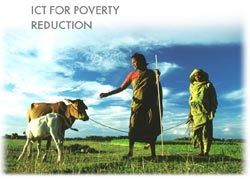
|
Key findings
Lessons Learned

-
The poor have to be at the centre of poverty reduction efforts:
-
Technologies used must be adequate to the skills of the poor in order to exploit their potential effectively.
-
Content should receive as much attention as connectivity – it must be people-centred, demand-driven and in local languages.
-
Attempts to use information communication technologies (ICTs) for poverty reduction are more effective when embedded and synchronised with other policies and resources:
-
A conducive environment, which includes freedom of expression, competitive markets, independent regulators, a universal service fund and other elements, is key.
-
National poverty reduction strategies or sector specific strategies for e.g. health or good governance allow for a targeted use of ICTs embedded in these other efforts.
-
In order to make use of information provided by ICTs, other resources must be available, e.g. job opportunities or access to credit or health services.
-
Ownership by the local communities, partnership and networking are key to effective poverty reduction programmes: donors should not look for implementers of their visions but for partners with their own vision and encourage and support them in implementing it. Partners are required at the local and national level as are specialised institutions in all areas which matter in a specific context.
Trends and Innovations
-
Integrated use and combination of different technologies: Internet and Community Radio or TV and local newspapers.
-
Integrated use and combination of different technologies: Internet and Community Radio or TV and local newspapers.
Collaboration with/among providers of relevant information (local health clinics, research institutes, self-help organisations) to establish effective linkages.
Priorities / Potential for Action
-
Give poor people a voice in decision making processes on all levels which affect their lives:
-
Local – information needs: priority areas for content are health, agriculture, weather, access to services. Women as key figures in information management deserve special attention.
-
National – conducive environment: freedom of expression, regulations for community radios, pro-poor service licences and integration of information needs in poverty reduction strategies.
-
Global – access to infrastructure and information: allocation of radio frequencies, Internet governance, intellectual property rights.
-
Integrate ICT concerns in poverty reduction and sectoral strategies and integrate poverty concerns in ICT-related regulation and policies.
Burning Questions
-
Poverty often has social and political roots – how can ICTs as technological tools be used to overcome social and political barriers?
-
Poverty reduction is part of a broader development process and takes time – how can ICTs, as attractive tools, achieve measurable results/impact in a reasonable time frame?
-
Poverty can be reduced by ICTs, there is enough anecdotal evidence – how can successful initiatives be scaled up and/or be implemented successfully in other regions?
|
|






